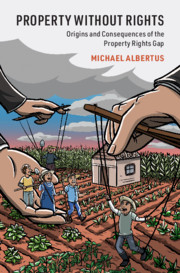Book contents
- Property without Rights
- Cambridge Studies in Comparative Politics
- Property without Rights
- Copyright page
- Contents
- Figures
- Tables
- Acknowledgments
- 1 Introduction
- 2 Conceptualizing and Measuring the Property Rights Gap
- 3 The Political Origins of the Property Rights Gap
- 4 Evidence on the Rise and Fall of Property Rights Gaps in Latin America
- 5 Consequences of the Property Rights Gap
- 6 Opening and Closing a Property Rights Gap in Peru
- 7 The Long-Term Consequences of Peru’s Property Rights Gap
- 8 Property Rights Gaps around the World
- 9 Conclusion
- Book part
- References
- Index
- Other Books in the Series (continued from page iii)
8 - Property Rights Gaps around the World
Published online by Cambridge University Press: 22 December 2020
- Property without Rights
- Cambridge Studies in Comparative Politics
- Property without Rights
- Copyright page
- Contents
- Figures
- Tables
- Acknowledgments
- 1 Introduction
- 2 Conceptualizing and Measuring the Property Rights Gap
- 3 The Political Origins of the Property Rights Gap
- 4 Evidence on the Rise and Fall of Property Rights Gaps in Latin America
- 5 Consequences of the Property Rights Gap
- 6 Opening and Closing a Property Rights Gap in Peru
- 7 The Long-Term Consequences of Peru’s Property Rights Gap
- 8 Property Rights Gaps around the World
- 9 Conclusion
- Book part
- References
- Index
- Other Books in the Series (continued from page iii)
Summary
This chapter examines land reform and property rights globally. First, it generates an original account of the principal features of property rights over land that governments have granted to beneficiaries in the course of all major redistributive land reform programs from 1900 to 2010, including land titling, nationalization, collectivization, and the formation of cooperatives. Second, it shows that democracy, dictatorship, foreign pressure, coalitions among landed elites, political elites, and peasants, and legislatures under democracy impact the opening and closing of property rights gaps around the globe as in Latin America. Finally, it conducts process-tracing exercises in Portugal and China to demonstrate further support for the theory's causal mechanisms and weigh that support against alternative explanations tied to ideology and limited state capacity. The discussion of China illuminates the enormous economic, social, and human costs – and political benefits – of retaining a large property rights gap for decades on end. Weak property rights contributed to the Great Famine, and then partial property rights reforms ignited national development in the countryside and in cities.
Keywords
- Type
- Chapter
- Information
- Property without RightsOrigins and Consequences of the Property Rights Gap, pp. 261 - 309Publisher: Cambridge University PressPrint publication year: 2021

